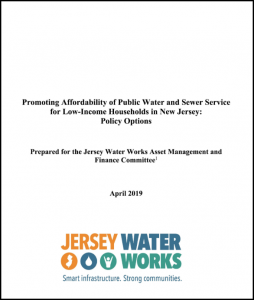Policy Options: Promoting Affordability of Public Water and Sewer Service for Low-Income Households in New Jersey
 This discussion paper presents policy options for improving affordability of water and wastewater service for lower income residents in New Jersey—for the benefit not only of those customers, but of all New Jerseyans, who depend on their local utilities for clean, safe, and reliable water and sewer service.
This discussion paper presents policy options for improving affordability of water and wastewater service for lower income residents in New Jersey—for the benefit not only of those customers, but of all New Jerseyans, who depend on their local utilities for clean, safe, and reliable water and sewer service.
Jersey Water Works aims to use it to spark discussion among state and local policy makers, utility managers, water and sewer customers, community organizations, and other public sector, private sector, and non-profit stakeholders, and to use it as a basis for further analysis and development of priority recommendations. The paper is based on a review of existing literature from around the country; research on existing New Jersey laws and programs; and interviews with leaders representing or associated with a wide range of stakeholders, including publicly and privately owned utilities, state regulators, affordable housing developers and advocates, consumer advocates, environmental justice advocates, business, and labor.
“A major deterrent to proper investment in water infrastructure is affordability . . . Municipalities with a larger share of low-income residents find it difficult to raise rates to fund water infrastructure upgrades due to the detrimental effect higher rates will have on those residents. The result is underinvestment, which is a losing proposition . . . However, while increasing rates can adversely affect low-income households, as several witnesses noted, these effects are not inevitable and can be avoided . . .” —New Jersey Legislature, Joint Legislative Task Force on Drinking Water Infrastructure, Final Report (Jan. 2018)